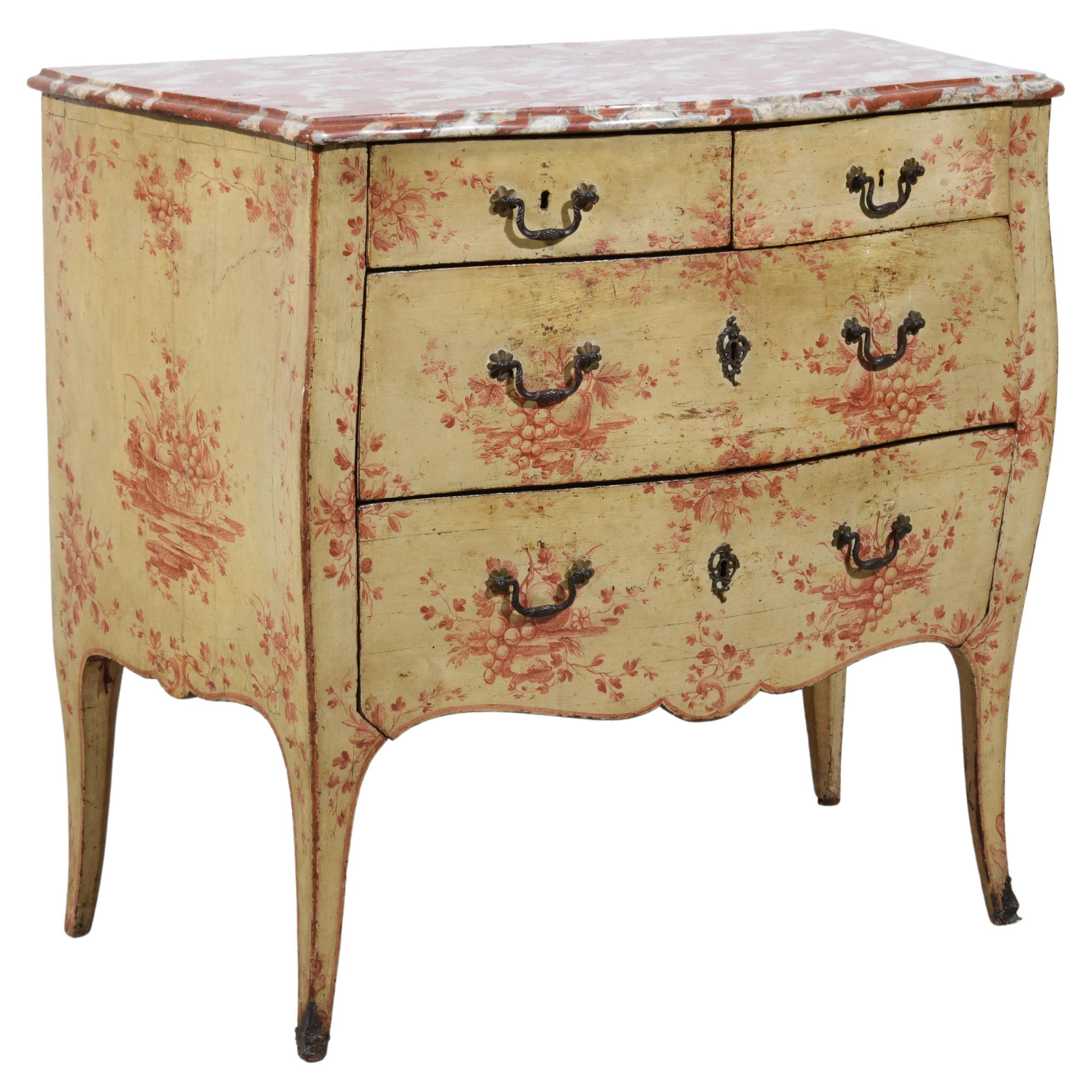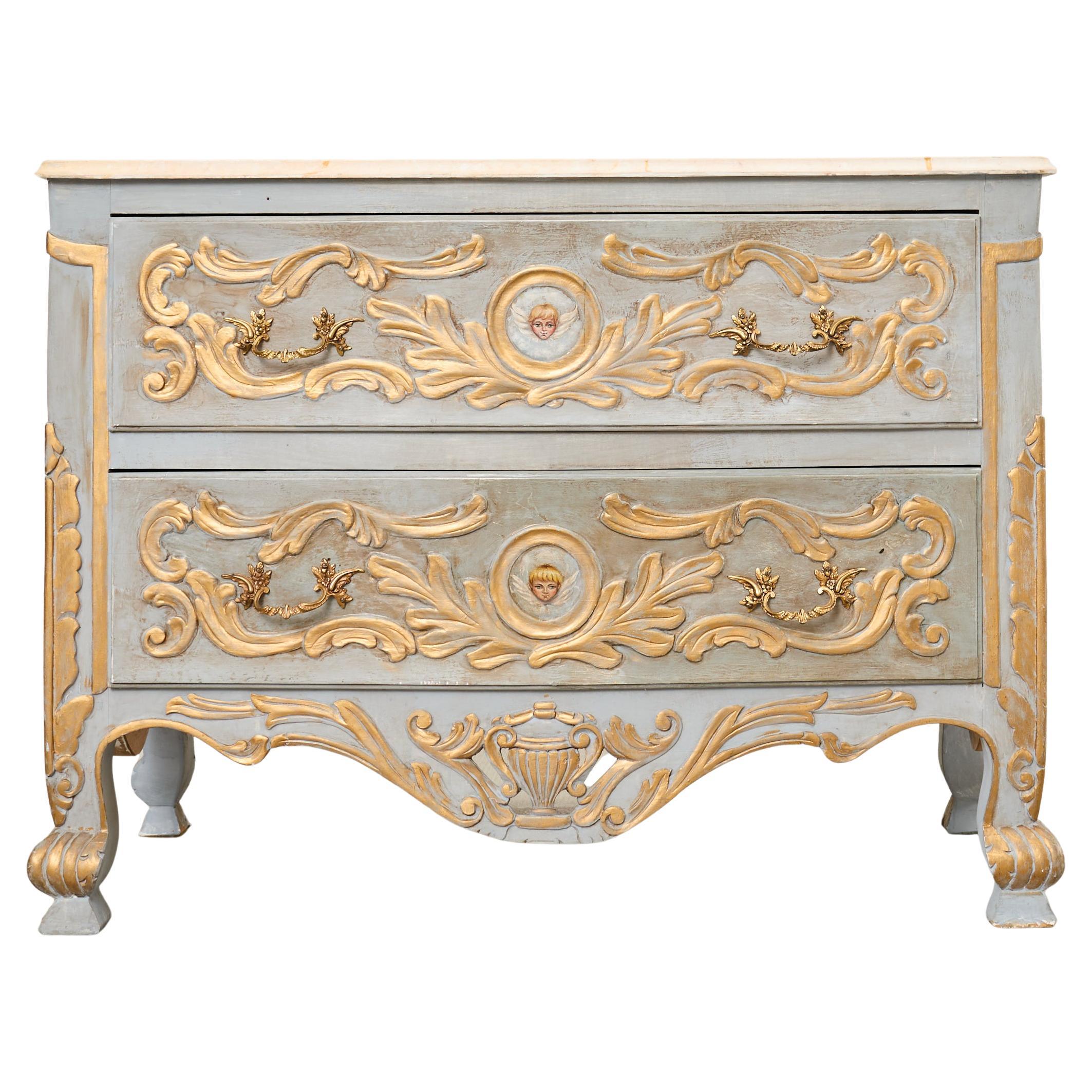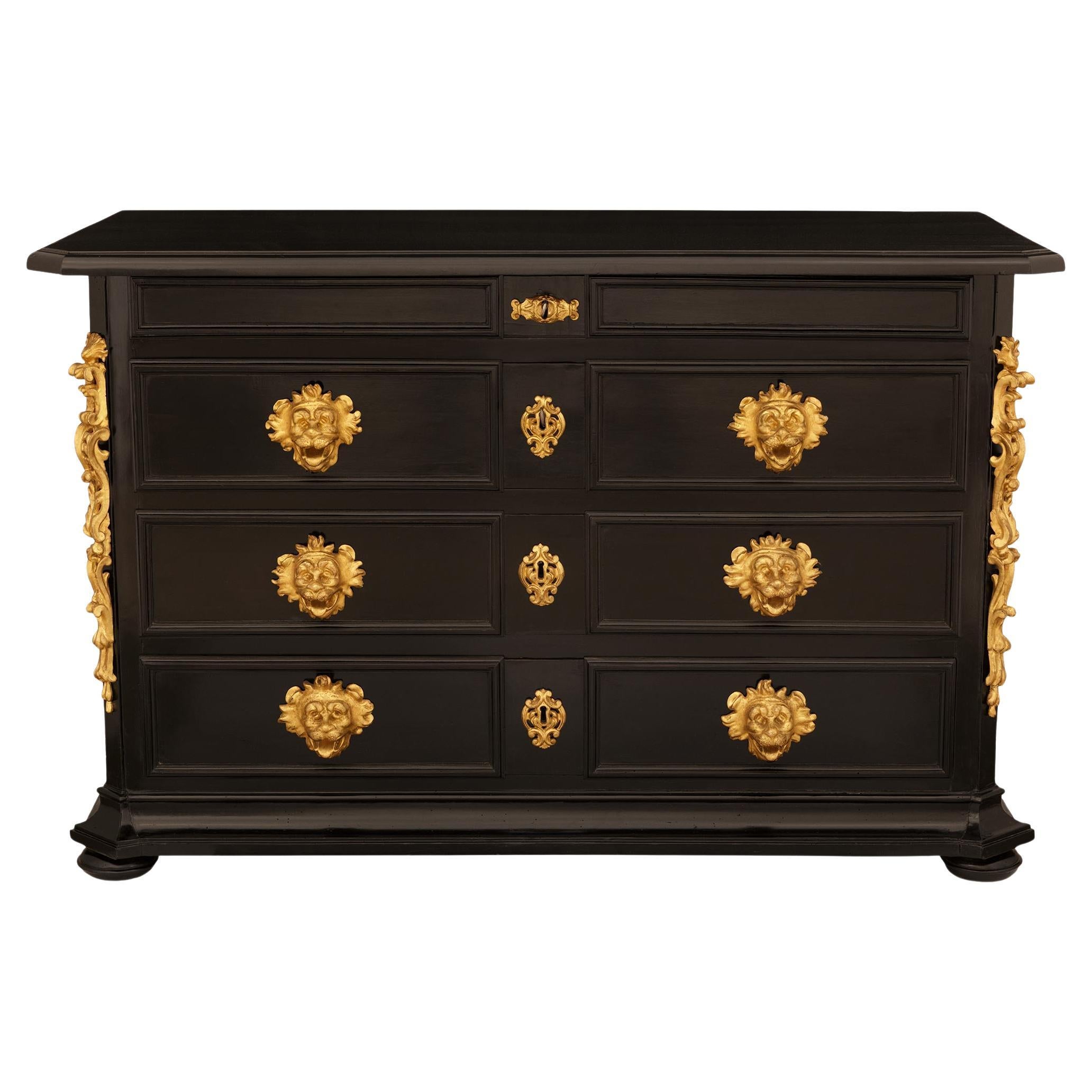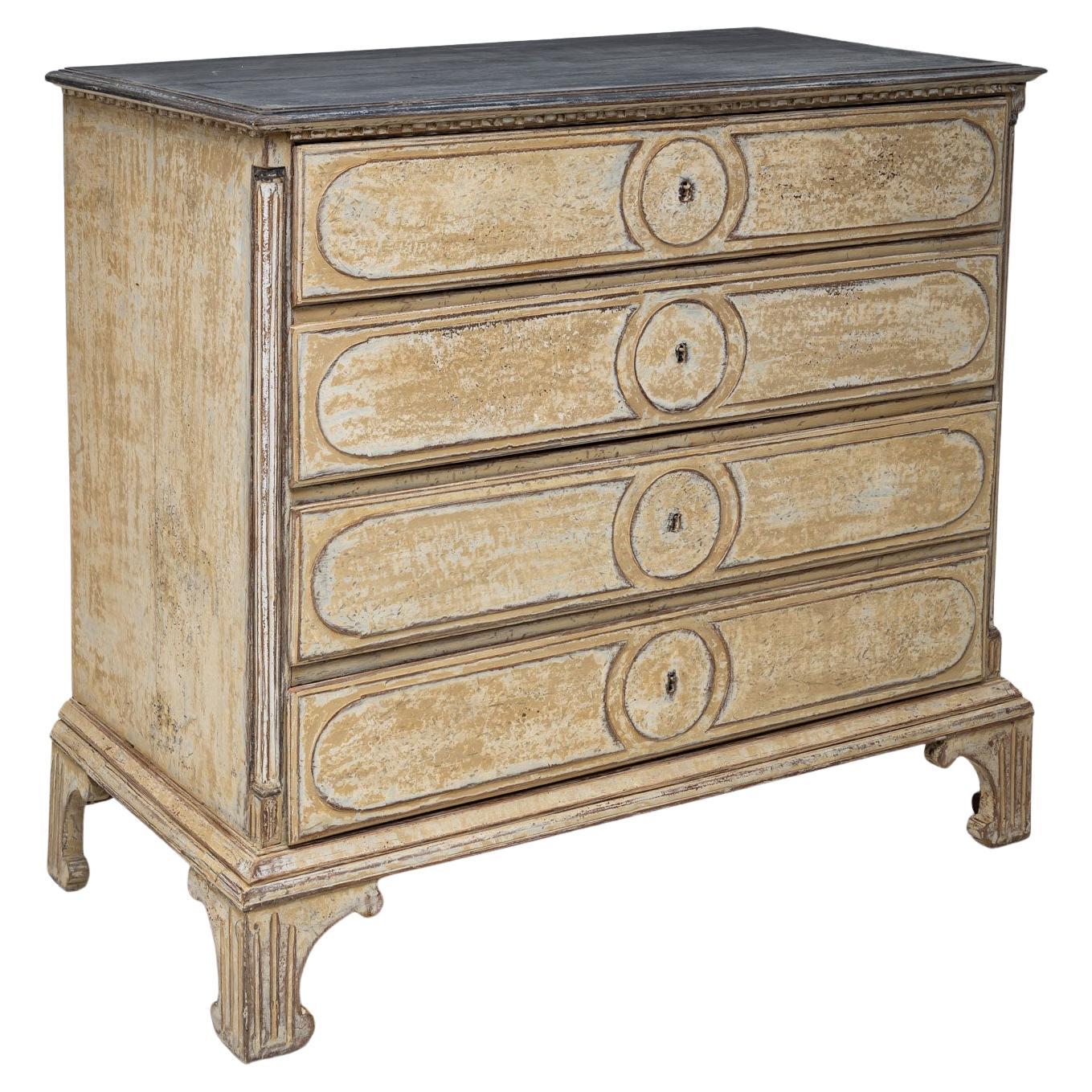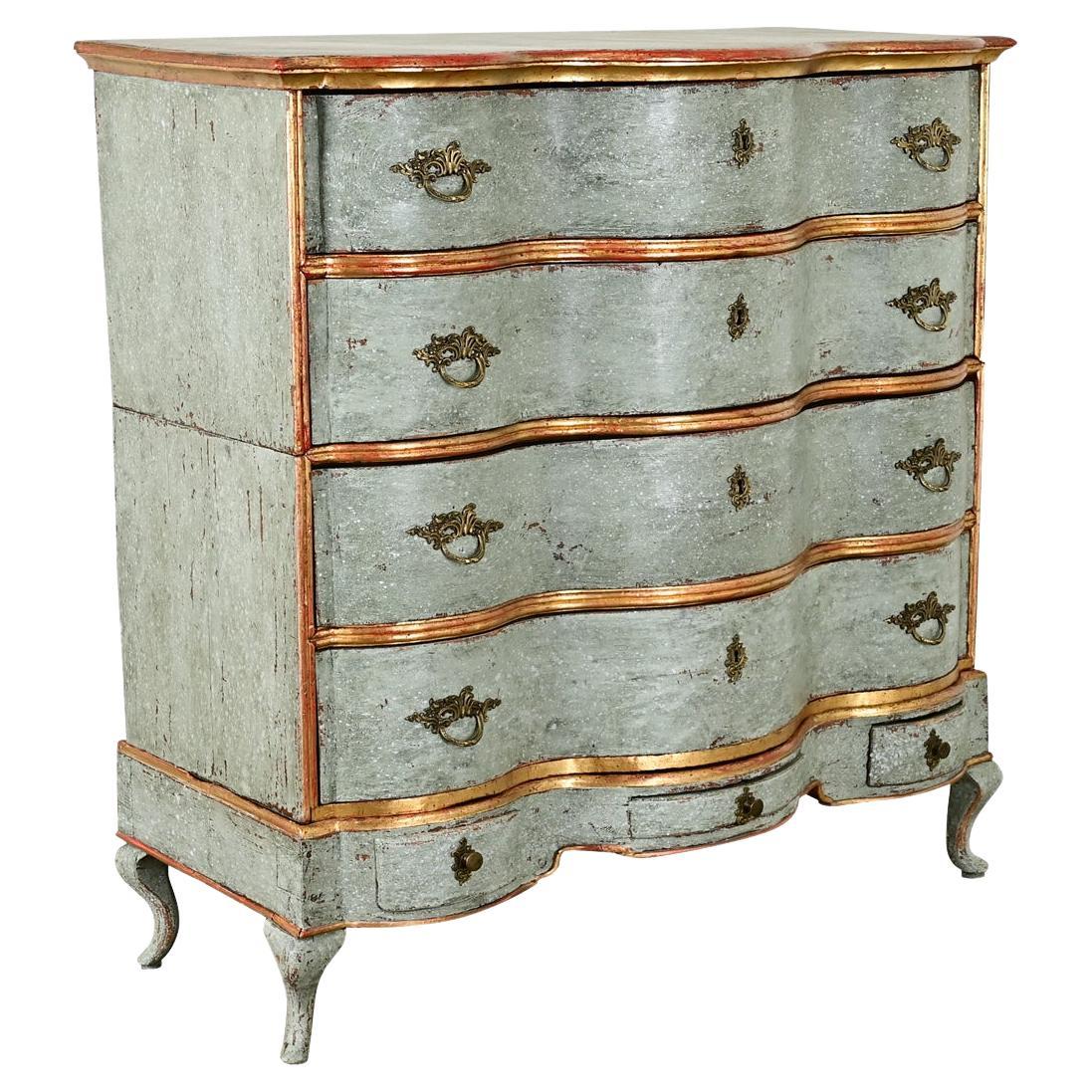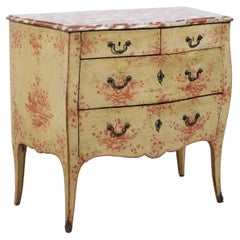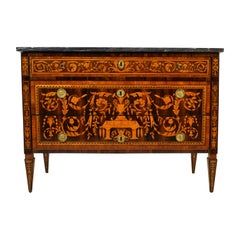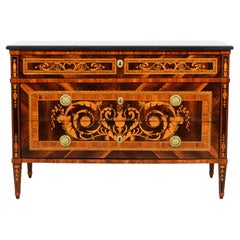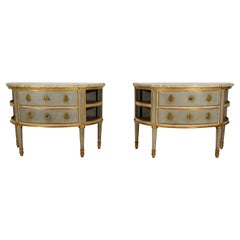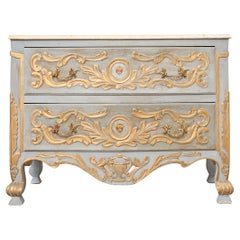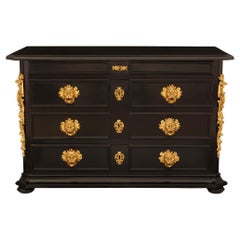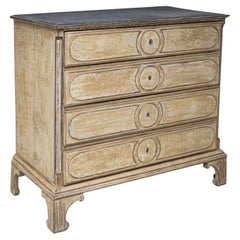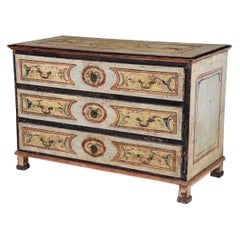Items Similar to 18th century, Italian Neoclassical Lacquered Wood Chest of Drawers
Want more images or videos?
Request additional images or videos from the seller
1 of 21
18th century, Italian Neoclassical Lacquered Wood Chest of Drawers
$19,560.90
£14,650.49
€16,500
CA$27,456.85
A$30,034.68
CHF 15,648.46
MX$361,384.67
NOK 198,166.95
SEK 186,059.77
DKK 125,678.82
About the Item
18th century, Italian Neoclassical Lacquered Wood Chest of Drawers
This neoclassical chest of drawers was made in Piedmont in the second half of the 18th century, in carved and lacquered wood.
The rectangular top with rounded corners is lacquered in faux marble. Through a folding opening system, the top can be opened by pressing a button on the front, which unhooks the closure. Under the floor there is a secret compartment, useful for storing documents or small objects.
The dresser is equipped with three drawers, with vents of the locks and handles in gilded bronze and chiseled decorated with neoclassical taste, including ribbons and bows. The drawers are decorated with embossed molded frames. The spaces of the background and overhang that are created are lacquered with different colors. The backgrounds are in light blue, some frames in blue and others in yellow, like the center of the drawer front. Similarly, the underside band has backgrounds in light blue and molded frame in blue. Near the corners, the wood is carved in the shape of a grooved lesena and lacquered in yellow and blue. The sides of the cabinet have a yellow background enclosed within a blue frame, heavenly backgrounds and yellow frame outside. In the corners of the blue frames of the furniture there are wooden elements lacquered in yellow of circular shape that contribute to the decoration of the furniture and the chromatic game. The four lacquered wooden feet have an inverted cone trunk, leaf elements, grooves and circular wooden tips.
This dresser retains the elegance of the time, very decorative for its particular color. Easily inserted in any furnishing context, it can be used in entrances, lounges, studios, bedrooms and bathrooms, being suitable for storing documents, personal items and clothing. Its particular dimensions make it a large piece of furniture and difficult to find in the antique market.
- Dimensions:Height: 40.16 in (102 cm)Width: 51.58 in (131 cm)Depth: 23.63 in (60 cm)
- Style:Neoclassical (Of the Period)
- Materials and Techniques:
- Place of Origin:
- Period:
- Date of Manufacture:Late 18th Century
- Condition:Wear consistent with age and use.
- Seller Location:IT
- Reference Number:1stDibs: LU4405238090862
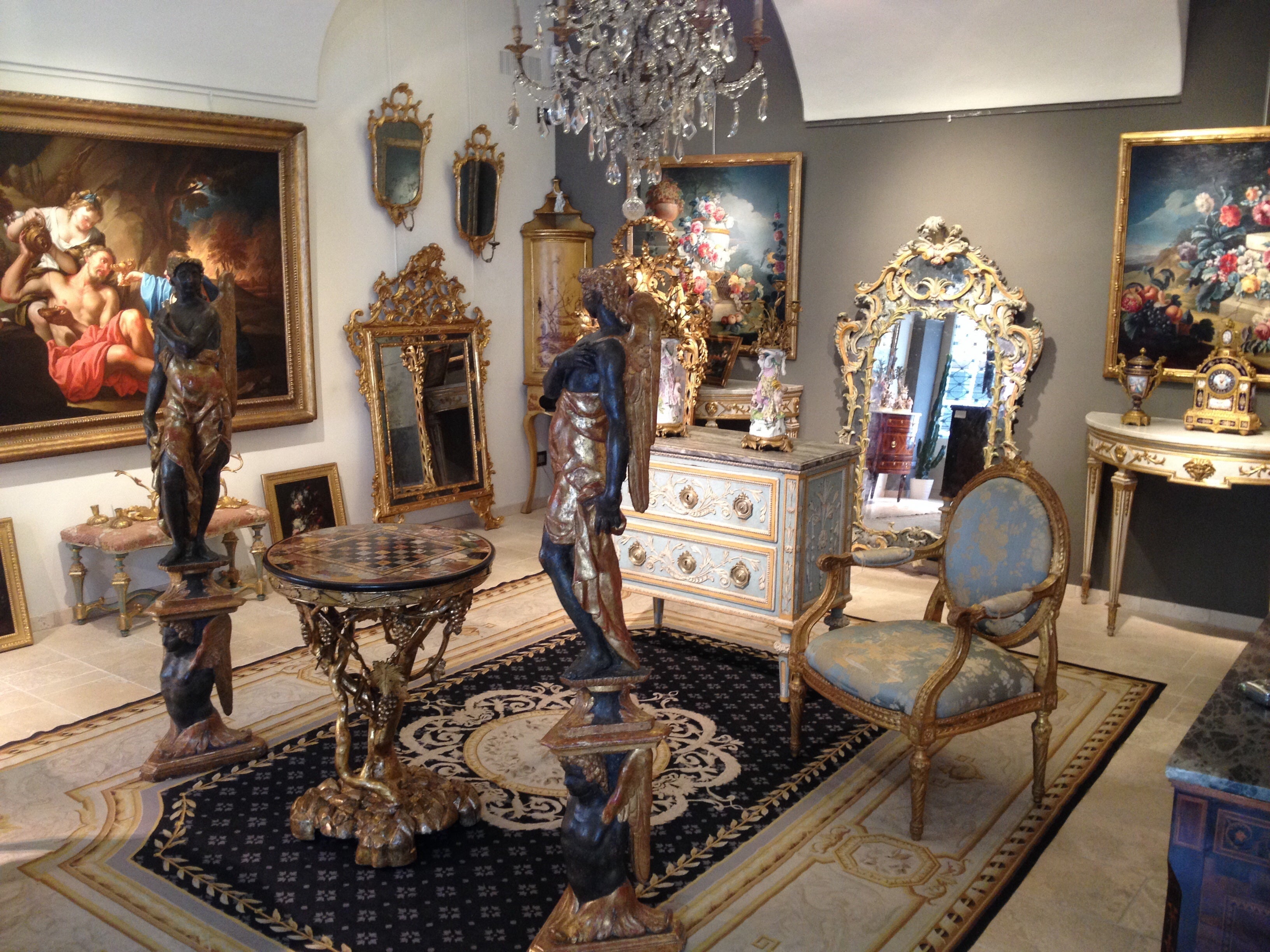
About the Seller
5.0
Vetted Professional Seller
Every seller passes strict standards for authenticity and reliability
Established in 1980
1stDibs seller since 2019
56 sales on 1stDibs
Typical response time: <1 hour
- ShippingRetrieving quote...Shipping from: Italy
- Return Policy
Authenticity Guarantee
In the unlikely event there’s an issue with an item’s authenticity, contact us within 1 year for a full refund. DetailsMoney-Back Guarantee
If your item is not as described, is damaged in transit, or does not arrive, contact us within 7 days for a full refund. Details24-Hour Cancellation
You have a 24-hour grace period in which to reconsider your purchase, with no questions asked.Vetted Professional Sellers
Our world-class sellers must adhere to strict standards for service and quality, maintaining the integrity of our listings.Price-Match Guarantee
If you find that a seller listed the same item for a lower price elsewhere, we’ll match it.Trusted Global Delivery
Our best-in-class carrier network provides specialized shipping options worldwide, including custom delivery.More From This Seller
View All18th Century, Italian Policrome Lacquered Wood Chest of Drawers
Located in IT
18th century, Italian Policrome Lacquered Wood Chest of Drawers
This small and elegant chest of drawers was made in Genoa, northern Italy, around the middle of the eighteenth century. This model of dresser is inspired by the models that spread in France in the Louis XV period and to which all the cabinet makers were immediately inspired. It consists of four drawers, of which two smaller upper. It has a wooden structure entirely lacquered in light ocre decorated with floral and foliate decorations and compositions of still life of fruit in shades of red. The handles and mouthpieces of the locks are in finely chiseled burnished bronze, typical of the Louis XV era. The molded top is in Rosso Francia marble, a marble from abroad that at the time was very precious and expensive. The dresser has the front and the sides moved by the move line, legs thin and slightly curved. The front legs are embellished with burnished bronze chiseled tips shaped like acanthus leaf.
This piece of furniture is quite rare because of its small size that make it easy to fit into any environment. Very decorative due to its sinuous lines and its fine decoration, it is suitable both next to antique furniture...
Category
Antique Mid-18th Century Italian Rococo Commodes and Chests of Drawers
Materials
Marble, Bronze
$30,349 Sale Price
20% Off
18th Century, Italian Neoclassical Inlaid Wood Chest of Drawers
Located in IT
18th century, Italian neoclassical inlaid wood chest of drawers
This refined neoclassical chest of drawers was done around the end of the 18th century in Genoa (Italy). The cabinet ...
Category
Antique Late 18th Century Italian Neoclassical Commodes and Chests of Dr...
Materials
Wood, Boxwood, Nutwood
$39,833 Sale Price
20% Off
18th Century, Italian Neoclassical Inlaid Chest of Drawers with Marble
Located in IT
18th century, Italian Neoclassical Inlaid Chest of Drawers with Marble Top
This refined neoclassical chest of drawers was made...
Category
Antique Late 18th Century Italian Neoclassical Commodes and Chests of Dr...
Materials
Wood, Nutwood
18th Century, Pair Demi-Lune Neoclassical Italian Lacquered Wood Chest ofDrawers
Located in IT
18th Century, Pair of Demi-Lune Neoclassical Italian Lacquered Wood Chest of Drawer
This pair of elegant drawers was made in the Piedmontese area (north of Italy) in the neoclassica...
Category
Antique Late 18th Century Italian Neoclassical Commodes and Chests of Dr...
Materials
Marble, Bronze
$34,616 Sale Price
20% Off
18th Century, Italian Neoclassical Inlaid Chest of Drawers, Marble Top
Located in IT
18th century, Italian neoclassical inlaid chest of drawers with marble top
This refined neoclassical chest of drawers was made...
Category
Antique Late 18th Century Italian Neoclassical Commodes and Chests of Dr...
Materials
Bronze
$34,142 Sale Price
20% Off
18th Century Italian Neoclassical Wood Dresser Attributed to Francesco Bolgiè
By Francesco Bolgié
Located in IT
18th century Italian neoclassical carved, lacquered and gilded wood dresser attributed to Francesco Bolgiè (1752?-1834).
The fine and elegant commode is made of finely carved, lacquered and gilded wood. It presents several stylistic and material elements characteristic of the wooden works and of the furniture present in the Piedmont area, between the end of the 18th century and the beginning of the 19th century. The richness of the ornaments, the gold leaf, the iconographic program and the significant level of cabinet making that characterizes this furniture are testimony of a wealthy client and the valuable work of a sculptor at the service of noble and royal families. Stylistically can be attributed to the famous italian sculptor Francesco Bolgiè (1752-1834).
The front of the furniture and the two side are characterized by a complex decorative architecture. Two horizontal perimeter bands show gilded carved geometric patterns and palmettes on a blue lacquered backdrop. The low frame, in the centre and on the front, has a half-moon element inside which is finely carved a lion with two cupids and laurel branches. Near the corners, at the top, are carved a female faces, while at the bottom are some bees. The fretwork of the vertical bands draws strings that support a bunch of grapes with vine leaves. The side walls are lacquered in ochre yellow and, at the centre, a frame with acanthus leaves outlines a lacquered space in the tones of the ancient rose violaceous, with in the centre an ornate leaf with fine girali. On the four sides of this frame four large golden flowers harmonize the together.
The front, similar in composition, has a yellow ochre background, internal frame with palmettes and four flowers. The large internal space, lacquered in antique pink, shows in the center a woman’s fece with a composition of grapes and wheat ears; from the face depart fine phytomorphic girals with racemes, bunches of grapes and vine leaves. The nozzle of the original lock, placed on the front of the cabinet and on top, is in gilded bronze, chiselled with ribbon motif. The front panel opens downwards. The interior of the cabinet, entirely lacquered in red, has a shelf and therefore two compartments. The red color cinnabar deliberately recalls the characteristic Chinese lacquer, at the time much loved for the decorations to cineseria furniture. The special folding lock system, which allows the opening and closing of the front door, is the original one.
The commode rests on four conical wood legs witch are carved with acanthus leaves and small ramage, gilded and lacquered.
The top of the furniture is in grey marble bardiglio valdieri, lithotype that had great success in Piedmont, in the north of Italy, since the middle of the 18th century. On it were usually exposed bronzes, candlesticks, watches and sculptures.
The sculpted subjects refer to a precise iconographic programme.
The female head is identifiable in Ceres, Mother Terra, which in classical iconography is depicted with the head surrounded by a sert of wheat ears and a cluster of grapes. Ceres or Demeter in Greek, sister of Zeus, in Greek mythology is the goddess of fertility, the guardian of crops, protector of agriculture and wheat, constant nurse of youth and of the green earth, author of the cycle of seasons, life and death, protector of marriage and sacred laws.
The representation of Ceres, and its meaning, are linked to bees, symbol of virtue and chastity, allegory of Mother Earth, rebirth, mercy and justice. Just as the leaves of the vine and its fruits: in many cultures, from Greco-Roman to Christianity, the vine is a symbol of well-being, fruitfulness and blessing; it represents an abundant life and the joy that flows from it; it reflects the desire for fertility and beauty. It is also a sign of devotion to the fruits of the spirit and protection from evil. Fullness, wisdom, youth, maturation, prosperity are all images associated with the vine. Sacrifice, faith and good will are the qualities required for the vine to bear fruit.
The inverted bezel shows the iconographic image of Amor Vincit...
Category
Antique Late 18th Century Italian Neoclassical Dressers
Materials
Giltwood, Wood
You May Also Like
Baroque Style Venetian Lacquered Commode Chest of Drawers
Located in Rio Vista, CA
Stunning Italian commode or chest of drawers featuring dramatic baroque style giltwood carved finishes and Venetian painted cameo reliefs. The large case has exquisite craftsmanship ...
Category
20th Century Italian Baroque Commodes and Chests of Drawers
Materials
Metal
Florentine 17th century Baroque Period ebonized Fruitwood and Giltwood chest
Located in West Palm Beach, FL
A handsome and most stunning Florentine 17th century Baroque Period ebonized Fruitwood and Giltwood chest. This exceptional four drawer chest is raised by bun feet below a mottled bo...
Category
Antique 17th Century Italian Baroque Commodes and Chests of Drawers
Materials
Giltwood, Fruitwood
Neoclassical Chest of Drawers, Scandinavia, around 1800
Located in Greding, DE
Large Neoclassical chest of drawers with four drawers and quarter columns at the corners standing on fluted cut-out feet. The drawer fronts are decorated with rounded panels. The che...
Category
Antique Early 1800s Swedish Neoclassical Commodes and Chests of Drawers
Materials
Wood
18th Century Italian Neoclassical
Polychrome Painted Commode
Located in Atlanta, GA
Italian, 18th century, case with pale blue paint with ebonized moldings and mustard, terracotta, and dark blue painted panels, bronze escutcheons, tenoned and dovetailed construction.
Category
Antique 1790s Italian Neoclassical Commodes and Chests of Drawers
Materials
Wood, Paint
Italian 20th Century Painted & Gilt Chest
Located in Baton Rouge, LA
A stately Italian chest of drawers has a flamboyant, scalloped facade with its original layered blue paint finish and gold gilt trim. The faux marble top sits above a chest of seven ...
Category
20th Century Italian Other Commodes and Chests of Drawers
Materials
Brass
Polychromed Italian Neoclassical Style Chest, 19th Century
Located in Houston, TX
Beautiful shades of pale green painted on this 19th century chest. The top
depicting a putti amidst a wreath band flora, the case with a bank of
three drawers, each in urn and scro...
Category
Early 20th Century Italian Neoclassical Commodes and Chests of Drawers
Materials
Wood
More Ways To Browse
Italian Hand Painted Commode
18th Century Italian Painted Commode
18th Century Neoclassical Commode
Italian Lacquered Chest
Italian Neoclassical Painted Commodes
Antique Yellow Cabinet
Cabinet Hand Painted Italian Yellow
Antique Dresser Small
18th Century Marble Top Dresser
Japanese Drawers Chest
Antique Tansu Cabinet
Antique White Storage Cabinet
Baroque Inlay
Commode French Antique Louis Xvi Chest Of Drawers
Small Oak Cabinet
1850 Mahogany
Antique Chippendale Chest
Arts And Crafts Chest Of Drawers
